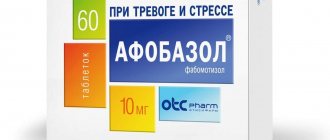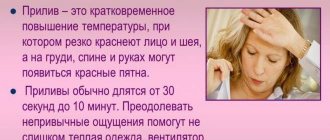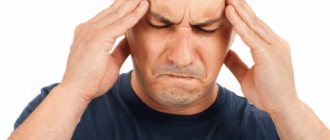“I could die, my health is in critical condition” - constant obsessive thoughts haunt me. Your heart is pounding, dark circles appear before your eyes, your chest feels tight, and breathing becomes difficult. Like a tsunami, incredible horror hits you - there is danger all around, strangers are walking around, everything is like in a horror film. An irresistible desire appears to run away “wherever you look,” to immediately hide from the whole world. Only after some time does the attack begin to go away, returning the world to its former colors, leaving the “victim” exhausted and devastated.
Main symptoms
Similar symptoms may affect approximately 2% of people around the globe. The female part of the population suffers from panic attacks almost 3 times more often than the male part. The reason lies in the biological and mental characteristics of the female body. PA, like an avalanche, hits suddenly and anywhere. Often these are crowded places: train stations, restaurants and cafes, shopping centers. But manifestations of the disease also occur in a closed space, for example:
- in the waiting room;
- elevator;
- public transport and so on.
As for the symptoms, the patient suffers from attacks of anxiety, which can develop into panic and only go away after a certain time. At the same time, a person’s heart rate increases, weakness and chills appear, increased sweating begins, and the mucous membranes dry out. Breathing becomes difficult, and attacks of suffocation may begin. Some patients experience gastrointestinal discomfort and nausea. My head is spinning and my sense of reality is lost. There is a fear of death, loss of consciousness or control.
When a person is in a state of panic attack, he often thinks that these are his last moments. Strange thoughts are spinning in his head, that now he will faint, and everyone will laugh, he thinks that he is going crazy, that he is dying.
Panic disorders are not life-threatening; moreover, panic disorder should not be confused with loss of reason or any mental illness. They do not lead to death, but their frequent manifestations can signal the development of neurosis that changes a person’s normal lifestyle.
A person experiencing the symptoms of panic attacks often withdraws into himself and tries to minimize visits to crowded places. He does not use public transport, refuses the elevator, and tries to avoid places where panic usually overtakes him. Life becomes gray and joyless, and the house becomes a “shelter” from the problem. This kind of disorder can lead to the development of various fears and phobias, for example, there is a fear of closed spaces, doctors or insects.
Panic attacks during menstruation
Since women are most prone to developing various psychological problems, they experience panic attacks before or during menstruation. Why does this happen, what provokes such conditions?
Doctors believe that the main reason for panic attacks before menstruation are:
- increased emotionality;
- excessive stress, to which representatives of the fair half of humanity are more prone than men;
- individual mental characteristics.
“Critical days” are a special period in the life of every woman . Hormonal changes begin in the body. It is the “play” of hormones that often causes the appearance of premenstrual syndrome. The latter’s faithful companions are vascular, somatic and psycho-emotional disorders. Your health may worsen. First of all, blood pressure “jumps”, you feel dizzy, problems with the stomach and intestines appear, and you often have a headache. A woman’s mood can change dramatically, she becomes aggressive, and loses her ability to work. Panic attacks, depression, and anxiety may occur during menstruation. Often a woman knows about all the possible consequences of PMS that she has and lives in anticipation of their manifestation. In this case, self-hypnosis plays a big role, which aggravates the state of mental and physical health.
How to get rid of this kind of problem? Conquering panic attacks during menstruation? It is impossible to completely protect yourself from their manifestation. But a positive psychological attitude often helps to successfully eliminate PMS. It is necessary to realize that the symptoms are temporary, they tend to end. Remember that PA, mood swings, anxiety will all pass soon.
A woman can help herself on her own. You should smile more often, look good, keep your emotions under control and not let depressive disorders dominate you. Try to look at all adversities a little philosophically, especially if PMS worsens. If you can’t cope with the problem yourself, the doctor will always help, tell you what to do, how to fix the problem.
Anxiety before menstruation. Truths and myths about PMS
PMS is a common phenomenon in women and is literally overgrown with all sorts of myths. Why does the mood deteriorate so much during this period? What is the truth and where is the lie?
Indeed, before menstruation, your well-being can be affected by:
- contraction of the endometrium in the uterus;
- sharp dilatation of arteries;
- breakthrough of blood through the endometrium with the arrival of the first day of menstruation.
Many women, on the contrary, maintain this state, because it’s beneficial. There is a reason to get out of some control, to throw out accumulated emotions and anger on family, friends or just those who are nearby. Such is the nature of women that, even occasionally, you want to cry, complain about troubles, problems in life.
Myths about PMS include similar signs that have virtually nothing to do with this syndrome and are not:
- inappropriate behavior;
- irritability;
- unreasonable ambitions;
- depression;
- manifestation of anger and rage.
Rather, these are problems of a psychological nature or personality traits, social adjustment in society, rather than arguments and signs of the development of premenstrual syndrome.
It is worth identifying some myths about PMS:
- PMS is a symptom of a bad mood and can be avoided by eating, for example, chocolate and sweets. It's a delusion. Even if carbohydrates are able to recharge, provide energy and improve well-being on the eve of menstruation, then they will not affect PMS. This is more of a woman’s psychological state than a cure for the syndrome. This can only mask the problem for a while.
- PMS syndrome is treated with sedative antispasmodics, painkillers and is incurable. In fact, the syndrome can be prevented if you listen to your body when symptoms intensify and on what days they begin to subside. Perhaps they appear more clearly in the middle of the cycle, which will make the treatment completely different.
This is a disease that can affect anyone in the world. It is not true. In fact, no more than 70% of women suffer from dizziness, fatigue, and abdominal cramps.
For some women, premenstrual syndrome is a normal way of life, for others it is real, torment and suffering, when irritability, hysteria, and nervousness set in.
PMS syndrome is cyclical. If it is noticed that behavior changes sharply and not for the better on specific days of the cycle, with the arrival of menstruation or after its completion, then you definitely need to seek help from a psychologist, psychiatrist, or therapist.
Perhaps the reason is the development of a serious internal disease and it makes itself felt. The hormonal background reacts with similar manifestations. It often happens that the causes of PMS are more psychological than physiological.
Panic attacks during menopause. Symptoms and treatment
The occurrence of panic attacks during menopause may be a signal of the onset of menopause. The changes that a woman’s body experiences during menopause concern not only internal organs and systems. They change the entire body completely. The symptoms of panic attacks during menopause are different, but any manifestations of this disorder must be eliminated. PA, in tandem with altered internal organs of a woman, can provoke many different problems, which can only be eliminated by hormonal treatment.
Menopause is a process of physiological changes in a woman’s reproductive organs . It is known that female hormones can influence not only the functioning of the genital organs, but also metabolism, the condition of muscles and blood vessels, blood pressure and the condition of the nervous system. Consequently, during this period not only menstruation is disrupted, but the mental perception of the surrounding world may change. Another reason for the appearance of panic states is aging. The woman understands that the years go by and her body is no longer as young as she would like.
Such attacks should be treated without delay, since the symptoms of the disease are clearly expressed and greatly affect the woman’s normal life. The problem can be eliminated with or without medication. As for medications, they should be prescribed exclusively by a doctor. He will determine the severity of the patient’s condition and prescribe the necessary medications. The doctor can prescribe not only hormonal medications, but also psychotropic ones, it all depends on the general condition of the patient. Treatment without medications includes homeopathy, the use of folk remedies, and prescriptions. In addition, herbal preparations are widely used.
Prevention of panic attacks is quite non-specific. It lies in the correct organization of the daily routine. A balanced diet and healthy sleep will help to avoid severe manifestations of the disease. In addition, the morning should begin with a smile and positivity; exercise and protection from stress are an excellent preventive measure.
As for the prognosis for recovery, it is positive. But a prerequisite for favorable treatment is timely diagnosis and elimination of the problem. Corrected hormonal levels in a timely manner and properly selected sedatives are the key to success.
Source: psycholekar.ru
Panic attacks during menstruation. What connects girls' periods and panic attacks?
Bad mood, nervousness and loss of energy before menstruation are inevitable for many women. And if the increased irritability that accompanies this period no longer surprises anyone, then panic attacks during menstruation can be alarming and frightening.
How are periods and PA related?
It is known that before the onset of critical days, the level of hormones in the blood fluctuates. The period when hormonal levels begin to “rage” is different for each woman, but usually this happens a few days before menstruation. The release of the egg provokes a sharp decrease in the level of the hormone estrogen, which has a negative impact on the emotional state of the woman. Mood swings, tearfulness, and irascibility can also be accompanied by physiological symptoms. Most often these are headaches, various sleep disorders, severe weakness, and discomfort in the stomach. In emotional and overly sensitive women, unwanted symptoms appear much more acutely, even leading to intense anxiety attacks. Therefore, we can say that PA is the same reaction of the body to a “raging” hormonal background, like irritability or a bad mood. The only difference is that those women whose psyche is more sensitive and weak suffer from panic attacks during menstruation.
Panic attacks during menstruation are characterized by symptoms typical of most anxiety attacks:
- increased blood pressure, rapid pulse, tachycardia;
- shortness of breath, feeling of suffocation, inability to take a full breath, lump in the throat;
- trembling in the body and limbs, fever or chills;
- diarrhea, flatulence, strong urge to urinate;
- spasms in various parts of the body, headache and dizziness;
- chest pain, feeling of squeezing, tightness;
- feeling of instability, faintness, derealization, fear of death.
It is worth noting that particularly susceptible girls may experience a panic attack only due to a misunderstanding of how menstruation is connected with some unpleasant physiological symptoms. For example, weakness and discomfort in the abdomen can frighten a woman so much that an acute anxiety attack will not take long to occur. Therefore, concern for one’s own health can also be considered one of the reasons for the occurrence of PA during menstrual periods.
What to do?
If panic attacks during menstruation are too intense and difficult to cope with on your own, you need to seek professional help. The doctor will conduct an examination and prescribe the necessary medications - tranquilizers, antidepressants or antipsychotics. Often, a patient suffering from acute panic attacks is prescribed psychotherapeutic sessions. At such sessions, a specialist finds out what caused the anxiety and carries out corrective work using special techniques.
Soothing herbs (infusion of sage or mint, decoction of hop cones), breathing exercises, massage, yoga, meditative techniques, and autogenic training can help you cope with PA on your own. Mild sedatives such as Persen, Afobazol, Novopassit will also be beneficial. It should be noted that even though these medications are available from pharmacies without a prescription, you should still consult your doctor before using them. It is possible that the patient will need some diagnostic testing since the drugs will be used during menstruation. In addition, you can use several useful tips:
- If possible, it is better to postpone any activities that may provoke anxiety and tension until the period when the condition has stabilized. Conflicts, showdowns, and serious disputes should be avoided whenever possible.
- Physical exercise will help you throw out aggression, recharge yourself with energy and positive emotions. For example, you can sign up for a fitness class or start jogging. Even regular morning exercises can be very useful.
- The support of loved ones never hurts. A confidential conversation with family or friends about what makes you nervous and worried will help you calm down, at least for a while.
- During your period, it is better to remove salty, spicy, smoked foods, as well as caffeine and alcohol from your diet. Dark chocolate will be beneficial.
- You should remind yourself often that unpleasant symptoms will not last long. Your mood will begin to return to normal within a day or two after the start of your period, you just need to be patient a little.
Hardening procedures, contrast showers, good sleep, giving up bad habits and active walks in the fresh air will also help make the nervous system less susceptible to stress situations and reduce the likelihood of panic attacks during menstruation.
When does a panic attack occur?
The mechanism of panic paroxysm is based primarily on the psychological factor, and the vegetative one is considered secondary. During an attack, there is an increase in the negative emotional background for 10–15 minutes, then a gradual decline. The provoking trigger is three factors, together or one at a time:
- psychogenic - conflicts and personal tragedies, as well as abstract factors of an informational nature;
- physiogenic - taking certain pharmacological drugs, steroids, alcohol, drugs, weather changes, overexertion, prolonged exposure to the sun, acclimatization);
- biological - fluctuations in hormones due to pregnancy, menstruation, abortion, childbirth, menopause, the onset of sexual activity, and the use of contraceptives.
The diagnosis is made if the attack recurs at least twice in the presence of several signs.
Vegetative symptoms include:
- sweating;
- feeling of a lump in the throat;
- a sharp rise in blood pressure;
- heartbeat;
- dry mouth;
- heat;
- chills;
- nausea;
- diarrhea.
From psychological:
- thoughts of approaching death, fear of dying;
- derealization;
- feeling of loss of self;
- dizziness, etc.
PA during menstruation: causes of occurrence
In women of fertile age, menstruation and panic attacks are closely related, and panic attacks are considered a typical, common, although not inevitable, manifestation of PMS. Let's consider the main manifestations of this disease.
Panic attacks before menstruation
The disorder is common mainly among female residents of megacities aged 25 to 45 years. Panic attacks before menstruation are more pronounced and occur with greater frequency. During this period, a woman experiences strong emotional stress and is prone to impulsive actions. Medicine considers the occurrence of attacks against this background as the result of hormonal fluctuations.
The patient may search for the reason for the recurrence of attacks for quite a long time. At the same time, the tests are normal, there are no serious pathologies, but every time the “red days of the calendar” approach, the attacks are repeated. And if panic usually results from stressful situations, then before menstruation it occurs for no apparent reason. A woman can be overcome by a wave of groundless fear, even when she is at work, among familiar people, performing her usual duties. And at a young age, this condition is especially difficult to cope with, since girls have not yet developed full adaptation to their living space.
Important! The insidiousness of panic disorder when menstruation approaches is also the fear of recurrence. Against the background of PMS, a panic attack anticipation syndrome is formed. The disturbing memory of the emotional state intensifies as it approaches the beginning of menstruation and naturally causes a repetition of the attack of fear. The connection between the attack and menstruation becomes inextricable, and the woman’s fears for her health intensify.
Panic attacks during menstruation
In the first half of the cycle, women's estrogen levels increase, and in the second - progesterone. These fluctuations are physiological and are aimed at cleansing the uterus to prepare it for a possible pregnancy. A woman experiences panic attacks during menstruation much more acutely, since the imbalance of the autonomic system increases due to the change in phases of the cycle, and the production of the joy hormone, endorphin, decreases.
Symptoms of a panic attack during menstruation may include mood swings, feelings of despair, increased pain in the lower abdomen, and severe headaches.
Sometimes, due to regular panic attacks before menstruation, agoraphobia develops - the fear of being in public. This is more likely to happen if attacks are repeated in crowded places, as there is a subconscious connection between panic and large crowds of people.
Tachycardia before menstruation. Tachycardia during menstruation
During the onset of menstruation, girls and women experience many unpleasant symptoms. These symptoms include tachycardia during menstruation, which can also appear with PMS. The pathology is manifested by the occurrence of a sharp rapid heartbeat, a feeling of lack of air, darkening of the eyes and the appearance of painful sensations in the chest. Tachycardia before menstruation and during menstruation leads to exhaustion of the heart muscle, so if a deviation occurs, you need to consult a doctor and start treatment.
What is tachycardia?
Tachycardia is a common cardiac arrhythmia characterized by rapid heartbeat. A person's pulse exceeds 90 beats per minute. The long-term existence of tachycardia can lead to a decrease in the efficiency of the heart, impaired contractility of the heart muscle and the occurrence of cardiomyopathy. It appears due to increased automaticity of the sinus node, which sets the pace and rhythm of contractions of the heart muscle or ectopic centers of automaticity.
Existing types of tachycardia are presented in the table:
| View | Characteristic |
| Physiological | It occurs as a physiological reaction to stimuli from the external environment. It appears in people without heart disease. |
| Pathological | Appears when there are disturbances in the functioning of the heart and causes a decrease in the amount of blood ejected. |
PA before menstruation: what to do
This condition is not life-threatening, but it greatly poisons existence. You can cope with the first signs of growing panic in logical ways.
The first step, when you feel that panic is clouding your mind, is to take control of your breathing and calm your heartbeat. After taking a deep breath, hold your breath and exhale slowly. You can also breathe into folded palms or a bag, while breathing with your stomach. This technique is aimed at saturating the blood with carbon dioxide, which suppresses the release of the hormone cortisol, which is responsible for sudden stress. Sometimes these actions are enough to capture the onset of an attack, block panic and prevent it from developing.
Panic attacks during PMS develop against the background of emotional instability caused by hormonal changes. This condition can be dealt with by switching the brain to perform some action. Remember, for example, the multiplication table, read words backwards, perform other actions in your mind. In a few minutes you will be convinced that the world around you is not collapsing and nothing terrible is happening.
Buy a rubber bracelet or weave one yourself from colored rubber bands and put it on your wrist. At the first sign of panic, pull back the rubber band and let go. A flick on the wrist will help you come to your senses and come to your senses a little.
A week before the start of your period, give up eating meat and include soothing herbal teas in your diet. This will reduce the production of cortisol by the endocrine system.
Do yoga. This ancient technique is aimed not only at achieving body beauty, but also mental clarity. Combine yoga with meditation practice. You will soon notice that panic attacks during PMS become less frequent and weaker.
In the video below you can see other ways to get rid of seizures:
First aid
Simple measures can be taken as preventive measures to help cope with an attack and prevent its progression:
- attempts to distract oneself by reading interesting literature, singing, trying to count backwards;
- perform breathing exercises that will help restore breathing - take a deep breath, hold for 3 seconds, and exhale slowly (perform 10-16 times);
- inflate balloons, blow soap bubbles, this will increase the level of carbon dioxide in the blood;
- perform distracting hand movements that replicate playing the piano;
- take warm foot baths, put your hands under hot water if you feel chills.
Panic attacks during menopause: symptoms and treatment
Characteristic signs of hormone deficiency during menopause may resemble manifestations of a panic attack: a woman is seized with fever and chills, her heart rate increases, outbursts of irritability and headache appear. One can be distinguished from one another only by a feeling of strong all-encompassing fear or causeless anxiety.
In general, every sixth woman suffers from panic attacks during menopause. The following factors can trigger an attack:
- smoking and drinking;
- constant stress and emotional overload;
- lack of sleep;
- physical exercise;
- inability to express emotions.
The number and intensity of panic attacks during menopause can be aggravated in the presence of such disorders as:
- obsessive-compulsive disorder;
- post-traumatic disorders;
- cardiovascular pathologies;
- emphysema;
- migraine;
- thyroid diseases;
- disruptions in the functioning of the adrenal glands;
- allergies of any origin.
Treatment of panic attacks during menopause includes hormonal therapy under the supervision of a doctor; the above recommendations for blocking the first signs of panic will also be useful.
Important! You cannot prescribe hormonal drugs on your own - the consequences can be unpredictable.
Interesting facts about PMS
- Crime chronicle. PMS is not only frayed nerves and broken plates. Most road accidents, crimes, and thefts committed by women occurred between the 21st and 28th days of the menstrual cycle.
- Shopping therapy. According to research, a few days before their period, women are most susceptible to the temptation to buy as much as possible.
- Women engaged in mental work and residents of large cities are more susceptible to symptoms of PMS.
- The term PMS was first used by Robert Frank, an obstetrician-gynecologist from England.
Does PMS exist? General information
Doctors have always tried to determine the reasons why women feel unwell and irritable in the days immediately before their period. In ancient times, this phenomenon was associated with various factors - the phases of the moon, the woman’s health, and the characteristics of the area where she lived. However, the state before menstruation was a mystery to the Aesculapians. Only in the twentieth century were doctors able to understand to some extent what was happening to the ladies.
Speaking about PMS - what it is, you should know how PMS stands for - premenstrual syndrome, which means - a manifestation characteristic of women in the days before menstruation. PMS is a set of symptoms that appear in women and girls a few days before the onset of menstruation.
Scientists are still researching what causes such manifestations and what this syndrome means. Those who are interested in how PMS is translated should learn in more detail what manifestations are characteristic of this condition. Each decoding of what PMS is in girls contains a description of all the characteristic symptoms and manifestations.
After all, PMS in women is a whole complex of symptoms, both physical and mental—scientists have counted about 150 of them. Approximately 75% of women experience premenstrual syndrome to varying degrees.
As a rule, PMS in girls begins to appear approximately 2-10 days before the day when signs of menstruation appear. After menstruation ends, menstrual syndrome also completely disappears.
Why does premenstrual syndrome occur?
Numerous studies have not been able to identify the exact causes of premenstrual syndrome. There are many theories of its occurrence: “water intoxication” (impaired water-salt metabolism), allergic nature (increased sensitivity to endogenous progesterone), psychosomatic, hormonal, etc.
But the most complete is the hormonal theory, which explains the symptoms of PMS by fluctuations in the level of sex hormones in the 2nd phase of the menstrual cycle. For the normal, harmonious functioning of a woman’s body, the balance of sex hormones is very important:
- estrogens - they improve physical and mental well-being, increase tone, creativity, speed of information absorption, and learning abilities
- progesterone - has a sedative effect, which can lead to depressive symptoms in phase 2 of the cycle
- androgens - affect libido, increase energy, performance
During the second phase of the menstrual cycle, a woman's hormonal background changes. According to this theory, the cause of PMS lies in the “inadequate” reaction of the body, including the parts of the brain responsible for behavior and emotions, to cyclical changes in hormonal levels, which is often inherited.
Since the days before menstruation are endocrine unstable, many women experience psycho-vegetative and somatic disorders. In this case, the decisive role is played not so much by the level of hormones (which may be normal), but by fluctuations in the content of sex hormones during the menstrual cycle and how the limbic parts of the brain, responsible for behavior and emotions, react to these changes:
- an increase in estrogen and first an increase and then a decrease in progesterone - hence fluid retention, swelling, engorgement and tenderness of the mammary glands, cardiovascular disorders, irritability, aggression, tearfulness
- hypersecretion of prolactin - also leads to fluid and sodium retention in the body
- excess prostaglandins - vegetative-vascular disorders, digestive disorders, migraine-like headaches
The most likely factors influencing the development of the syndrome, about which medical opinions do not differ:
- A decrease in the level of serotonin, the so-called “hormone of joy,” may be the cause of the development of mental signs of premenstrual syndrome, since a decrease in its level causes sadness, tearfulness, melancholy and depression.
- Vitamin B6 deficiency - a lack of this vitamin is indicated by symptoms such as fatigue, fluid retention in the body, mood swings, and breast hypersensitivity.
- Lack of magnesium - magnesium deficiency can cause tachycardia, dizziness, headaches, and cravings for chocolate.
- Smoking. Women who smoke are twice as likely to experience premenstrual syndrome.
- Overweight. Women with a body mass index of over 30 are three times more likely to suffer from PMS symptoms.
- Genetic factor - it is possible that the characteristics of premenstrual syndrome are inherited.
- Abortion (consequences), complicated childbirth, stress, surgical interventions, infections, gynecological pathologies.
PMS at 40 years old. What it is
Premenstrual syndrome (PMS) is a combination of physical and psychological (emotional) symptoms that begin in women after ovulation and continue until the onset of menstruation. During this period, estrogen levels decrease and progesterone increases. Some time must pass for their concentration in the blood to settle.
Every month, about 80% of women of reproductive age suffer from premenstrual syndrome. Almost every second woman after 40 years old faces this problem. In 13-26% of cases, psychological and physical symptoms are so severe that they interfere with normal daily activities.
The most severe form of PMS with a predominance of mental disorders is premenstrual dysphoric disorder, which occurs in girls in rare cases.
Most women consider this period an integral part of women's lives and are in no hurry to seek professional help.
Many doctors claim that premenstrual syndrome disappears after the first pregnancy. There is some truth in this, since after the birth of a child, hormones change, which has a significant impact on the course of PMS. Often during pregnancy, hormonal medications are prescribed, which subsequently alleviate the symptoms of PMS or eliminate them altogether.
Causes
Although scientists are still trying to explain the causes of various symptoms of premenstrual syndrome, the main culprits of this condition remain the “warring” hormones estrogen and progesterone. This hormonal imbalance can cause mood swings and painful sensations.
The form and intensity of this condition directly depends on our lifestyle and our emotional state. Some problems associated with PMS are often inherited. There is a high probability that you will also have to go through this period, just as your mother or grandmother once did.
Symptoms of the syndrome may worsen as a result of illness or physical exhaustion.
PMS symptoms can also be caused by low levels of serotonin, which is responsible for signaling between brain cells. An unbalanced diet, especially a lack of iron in the body, is also a risk factor. Blood clotting disorders are also a risk.
Since premenstrual syndrome affects the emotional and mental state, psychological disorders, depression, increased anxiety and other problems of this nature may arise against its background.
Hormones during the menstrual cycle
Signs of premenstrual syndrome
Experts say premenstrual syndrome can include up to 300 symptoms. This high number is partly due to the fact that there is no definitive diagnosis that can better differentiate PMS from either the normal condition or from other conditions such as depression or anxiety disorders.
The most common symptoms of premenstrual syndrome are:
- irritability and mood swings;
- anxiety, tearfulness, depression;
- headache;
- increased sensitivity and soreness of the mammary glands;
- pain in the lower abdomen;
- bloating, decreased or increased appetite;
- change in libido;
- sleep disorders;
- fatigue;
- swelling of the joints.
All these symptoms may remain during menstruation and disappear after it stops.
Main symptoms and manifestations of premenstrual syndrome
Groups of symptoms for PMS:
- Neuropsychic disorders: aggression, depression, irritability, tearfulness.
- Vegetovascular disorders: changes in blood pressure, headache, vomiting, nausea, dizziness, tachycardia, pain in the heart.
- Metabolic and endocrine disorders: edema, increased body temperature, chills, engorgement of the mammary glands, itching, flatulence, shortness of breath, thirst, memory loss, blurred vision.
PMS in women can be divided into several forms, but their symptoms usually do not appear in isolation, but are combined. In the presence of psychovegetative manifestations, especially depression, women’s pain threshold decreases and they perceive pain more acutely.
Neuropsychiatric | Crisis form | Atypical manifestations of PMS |
Disturbances in the nervous and emotional spheres:
|
Most women have diseases of the cardiovascular system, kidneys, and gastrointestinal tract. |
|
Edema form | Cephalgic form | |
Negative diuresis with fluid retention is noted. | The leading ones are mainly neurological and vegetative-vascular manifestations:
The family history of women with this form is burdened with hypertension, cardiovascular diseases, and gastrointestinal diseases. |
PMS occurs differently in every woman, and symptoms vary significantly. According to the results of some studies, women with PMS have the following frequency of manifestation of one or another sign of PMS:
| Symptom | frequency % | |
| irritability | 94 | |
| breast tenderness | 87 | |
| bloating | 75 | |
| tearfulness | 69 | |
| 56 | |
| 50 | |
| 44 | |
| 37 | |
| 19 | |
| vomit | 12 | |
| constipation | 6 | |
| pain in the spine | 3 |
Premenstrual syndrome can aggravate other diseases:
- Anemia (see iron supplements for anemia)
- Epilepsy (symptoms, treatment)
- Migraine (see triptans for migraine)
- Thyroid diseases
- Chronic fatigue syndrome
- Bronchial asthma
- Irritable bowel syndrome
- Allergic reactions
- Inflammatory diseases of the female genital organs
Diagnostics: what can masquerade as symptoms of PMS?
Since dates and deadlines are easily forgotten, to make your task easier, you should keep a calendar or diary where you write down the start and end dates of menstruation, ovulation (basal temperature), weight, and symptoms that bother you. Keeping such a diary for 2-3 cycles will greatly simplify diagnosis and allow you to track the frequency of PMS symptoms.
| To make a diagnosis, 4 or more of the following signs must be present: | And at least 1 of the following: |
|
|
The severity of premenstrual syndrome is determined by the number, duration and intensity of symptoms:
- Mild form: 3-4 symptoms or 1-2 if they are significantly pronounced
- Severe form: 5-12 symptoms or 2-5, but very pronounced, and regardless of the duration and their number, if they lead to disability (usually the neuropsychiatric form)
The main feature that distinguishes premenstrual syndrome from other diseases or conditions is cyclicality. That is, deterioration in well-being occurs several days before menstruation (from 2 to 10) and completely disappears with their arrival. However, unlike psycho-vegetative ones, physical discomfort in the first days of the next cycle can intensify and smoothly transform into disorders such as painful periods or menstrual migraine.
- If a woman feels relatively well in phase 1 of the cycle, then this is premenstrual syndrome, and not a chronic disease - neurosis, depression, fibrocystic mastopathy
- If pain appears only immediately before and during menstruation, especially when combined with spotting in the middle of the cycle, it is most likely not PMS, but other gynecological diseases - endometriosis, chronic endometritis, dysmenorrhea (painful menstruation) and others.
To establish the form of the syndrome, studies of hormones are carried out: prolactin, estradiol and progesterone. The doctor may also prescribe additional diagnostic methods, depending on the prevailing complaints:
- For severe headaches, dizziness, tinnitus, decreased vision and fainting, a computed tomography or MRI scan is prescribed to rule out organic brain diseases.
- If there is an abundance of neuropsychiatric diseases, an EEG is indicated to exclude epileptic syndrome.
- In case of severe edema, changes in the daily amount of urine (diuresis), tests are performed to diagnose the kidneys (see causes of swelling of the legs).
- In case of severe and painful engorgement of the mammary glands, it is necessary to perform an ultrasound of the mammary glands and mammography to exclude organic pathology.
Not only a gynecologist examines women suffering from PMS, but also involves psychiatrists, neurologists, endocrinologists, nephrologists, cardiologists and therapists.
Premenstrual syndrome or pregnancy?
Some symptoms of PMS are similar to those of pregnancy (see first signs of pregnancy before delay). After conception, the content of the hormone progesterone increases in a woman’s body, which also occurs during PMS, so the following symptoms are identical:
- fast fatiguability
- breast swelling and tenderness
- nausea, vomiting
- irritability, mood swings
- lower back pain
How to distinguish pregnancy from PMS? Comparison of the most common symptoms of premenstrual syndrome and pregnancy:
| Symptoms | Pregnancy | Premenstrual syndrome |
| accompanies the entire pregnancy | with the onset of menstruation the pain goes away |
| the attitude towards food changes, you want inedible, salty, beer, things that a woman usually doesn’t like, the sense of smell is greatly heightened, ordinary smells can be very irritating | may crave sweet and salty foods, sensitivity to smells |
| only in later stages | May have lower back pain |
| starts 4-5 weeks after conception | can appear either immediately after ovulation or 2-5 days before menstruation |
| mild, short-lived pain | individually in each case |
| frequent mood swings, tearfulness | irritability |
| Maybe | No |
| from 4-5 weeks after conception | possible nausea, vomiting |
The signs of both conditions are very similar, so it is not easy to understand what exactly is happening in a woman’s body and distinguish pregnancy from PMS:
- The easiest way to find out what causes poor health is to wait until your period starts.
- If the calendar is already late, you should take a pregnancy test. A pharmacy test will give reliable results only if menstruation is delayed. It is sensitive to the pregnancy hormone (hCG) excreted in the urine. If you don’t have the patience and nerves to wait, you can take a blood test for hCG. It shows almost one hundred percent results on the tenth day after conception.
- The best option to find out what is bothering you - PMS syndrome or pregnancy - is to visit a gynecologist. The doctor will assess the condition of the uterus and, if pregnancy is suspected, prescribe an ultrasound.
When to see a doctor
If the manifestations of premenstrual syndrome significantly reduce the quality of life, affect the ability to work and are of a pronounced nature, treatment cannot be avoided. After a thorough examination, the doctor will prescribe drug therapy and give the necessary recommendations to alleviate the syndrome.
Strong PMS forum. Terrible PMS
Anonymous
Date: 01/15/16 Time: 01:27
| It’s been 3 years now. It’s been very protracted and creepy. soon to be 36 years old. 3 days after O, darkness begins... despondency and apathy are increasing, in the last 2 days the roof has been going crazy. I’m somehow holding back with the child, but I really hate my husband, I’m ready to kill him. Naturally, I feel like the most unhappy person in the world. somehow I had a record of PMS for 2 weeks... I thought I was going to go crazy. What is it from, what vitamins are missing in the body, how to correct it.? I’m not going to take hormones, I took a test for female hormones a couple of years ago, everything is ok. Persen obviously doesn’t help anymore, afobazole, tenoten, what else? In general, I want to drink something herbal for long-term PMS. St. John's wort? now it’s 10 days, I love everyone, I’m completely positive))) in 10 days I’ll turn into a complete schmuck. |
How can a doctor help?
In most cases, treatment is symptomatic. Depending on the form, course and symptoms of premenstrual syndrome, a woman needs:
- Psychotherapy - mood swings, irritability, depression, from which both the woman and her loved ones suffer, are corrected using stabilizing behavioral techniques, psycho-emotional relaxation, and sedatives.
- For headaches, lower back and abdominal pain, non-steroidal anti-inflammatory drugs are prescribed for temporary pain relief (Ibuprofen, Nimesulide, Ketanov, see tablets and injections for pain).
- Diuretics to remove excess fluid from the body during edema (see herbal diuretics).
- Hormonal therapy is prescribed for insufficiency of the second phase of the cycle, only after functional diagnostic tests, based on the results of identified changes. Progestins are used - Duphaston, Medroxyprogesterone acetate from 16 to 25 days of the cycle.
- Antidepressants and tranquilizers are prescribed for a variety of neuropsychiatric symptoms (insomnia, nervousness, aggressiveness, anxiety, panic attacks, depression): Amitriptyline, Rudotel, Tazepam, Sonapax, Sertraline, Zoloft, Prozac, etc. in phase 2 of the cycle after 2 days from the onset of symptoms.
- In crisis and cephalgic forms, it is possible to prescribe Parlodel in phase 2 of the cycle, or if prolactin is elevated, then in a continuous mode, it has a normalizing effect on the central nervous system.
- For cephalgic and edematous forms, antiprostaglandin drugs (Indomethacin, Naprosyn) are recommended in the second phase of the menstrual cycle.
- Since women often have elevated levels of histamine and serotonin during PMS, the doctor may prescribe 2nd generation antihistamines (see allergy pills) 2 days before the expected worsening of the condition at night before the 2nd day of menstruation.
- To improve blood circulation in the central nervous system, it is possible to use Grandaxin, Nootropil, Aminolon for 2-3 weeks.
- In case of crisis, cephalgic and neuropsychic forms, drugs that normalize neurotransmitter metabolism in the central nervous system are indicated - Peritol, Difenin, the doctor prescribes the drug for a period of 3-6 months.
- Homeopathic medicines Remens or Mastodinon.
Source: zdravotvet.ru










